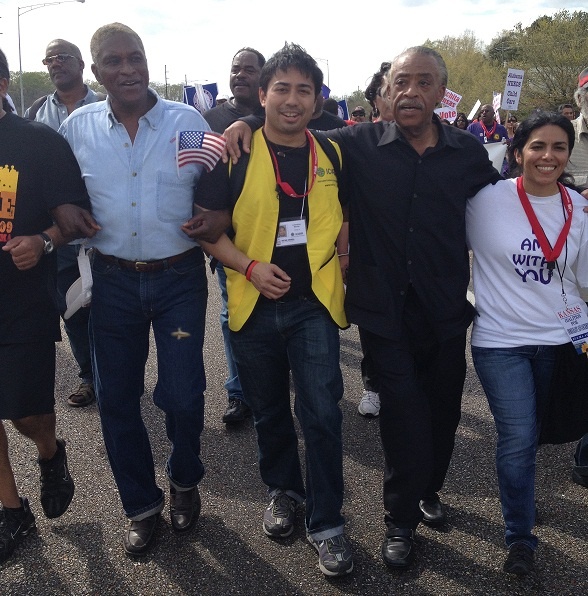47 years later in Alabama, another march for justice

By Kathy Mulady, Equal Voice News
In March 1965, thousands of civil rights supporters, led by the Rev. Martin Luther King, Jr., marched from Selma, Ala., to the Capitol in Montgomery in support of voting rights for African-Americans.
Last week, 47 years later, civil rights activists calling for an end to harsh anti-immigrant laws retraced that route in a powerful show of solidarity between African-Americans and Latinos.
Alabama, the seat of the civil rights movement, became the focus of the immigration debate after state legislators passed the harshest anti-immigrant law in the country last year.
By Thursday afternoon, more than a thousand people were walking along U.S. Hwy. 80, each group in bright T-shirts, singing, chanting and sharing their stories. Buses arrived throughout the day, bringing more supporters from Chicago, New York, Los Angeles, Georgia, Maryland and Tennessee. In addition to their support of immigrant rights, the marchers carried signs advocating workers rights, voting rights, and the right to quality education and child care.
Many marchers stopped overnight in St. Jude, on the outskirts of Montgomery, for a mass meeting, just as the first marchers did nearly a half-century ago. They were joined by a few of the original participants and longtime civil rights leaders, including the Rev. Jesse Jackson.
Co-hosts for the event were Sophia Bracy Harris, executive director of the Federation of Child Care Centers of Alabama, and Mayra Rangel, with the Alabama Coalition for Immigrant Justice.
Bracy Harris has fought for justice her entire life. She was one of the first students to integrate her Alabama high school. Her family’s home was firebombed as a result.
"To have a child advocate and an immigrant advocate -- one a young female Latina organizer and the other a seasoned female African-American organizer -- serve as mistresses of ceremonies at a rally of hundreds is a pretty powerful indication of how far we have come in the collaboration of brown and black and the role of female leaders as champions for justice," said Bracy Harris.
"The march and events of this past week created opportunities for young people to define the fight for their futures. The many issues facing young people -- immigration rights, children's issues, voting rights, education, health care, the cradle to prison pipeline -- are all interconnected and together they create the big picture of the overall fight for us all, and particularly for our children and their children," she said.
Juan Rodriguez, an organizer with the Florida Immigrant Coalition and One Miami, traveled by bus with 40 others from Miami to join the march and show solidarity.
"Our delegation is an extremely diverse mix of races, languages ethnicities and ages," said Rodriguez, noting that they are easily recognized in their orange T-shirts emblazoned with "We are Florida," a picture of the sun, and "Let it shine on Alabama."
"We want to share our love and support for our brothers and sisters here," said Rodriguez. "I am an immigrant from Colombia; my parents made huge sacrifices to give me a chance. The majority of my family was denied political asylum. I lost a lot of people. I don't want others to feel that pain."
Lawrence Benito, chief executive for the Illinois Coalition for Immigrant and Refugee Rights, walked the route with members of his organization.
"We came to support worker rights, voter rights and immigrant rights," said Benito. "Walking along this historic route, we definitely feel like we are standing on the shoulders of giants. We have learned much from the earlier struggle."
Benito said the Illinois coalition is staying an extra day in Alabama to meet with African-American leaders to build relationships and develop a shared agenda for moving forward.
When Alabama legislators passed the tough anti-immigrant law last year, it struck close to the heart of many African-Americans, who remember all too clearly the injustices and their struggle for civil rights.
When the legislation was signed into law by Gov. Robert Bentley last June, many of Alabama's leading African-American organizations and churches stood up and promised to fight again.
The anti-immigrant law created a wave of fear and panic across the state. Some Latino families left their homes, moving to other states. Many parents pulled their children out of school. Conventions were cancelled amid concerns participants would be profiled and hassled. Japanese and German executives at Alabama's Honda and Mercedes car plants were arrested under the new law -- worrying some that major employers would leave the state.
Several state legislatures in the last two years have passed or tried to pass anti-immigrant legislation. Arizona was the first, but Alabama's law, adopted last year, is the most extreme. Opponents of the law are making progress in overturning some elements of the legislation.
Last Thursday, the 11th U.S. Circuit Court of Appeals temporarily blocked a section that says courts cannot enforce contracts involving undocumented immigrants and another that makes it a felony for an undocumented immigrant to do business with the state, according to Associated Press reports.
Despite the critical issues, the atmosphere as people marched to the Capitol was hopeful. Participants took pictures, tweeted updates to supporters back home, and shared their backgrounds and experiences with each other.
"It's been very positive," said Tania Lang Burger, a communications coordinator who works with Bracy Harris. "There are lots of conversations and wonderful exchanges with people all along the route. The police are there, but they have been only helpful. People drive by and honk and wave."
(PHOTO: Lawrence Benito of the Illinois Coalition for Immigrant and Refugee Rights, center, was among the marchers from Selma to Montgomery. Next to Benito is Rev. Sharpton and Sulma Arias, at far right, with Sunflower Community Action in Kansas. Photo courtesy of ICIRR via Equal Voice.)
Tags
Equal Voice News
Equal Voice News covers news about America's working families, poverty and policy.
